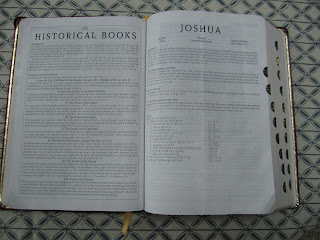Posted by Lisa Laree to Beer Lahai Roi
After the cities of refuge were designated, the heads of the Levite clans came to Joshua and reminded him that the command of the Lord to Moses regarding the division of the land included cities for the Levites to possess and dwell in, since they were not given a territorial inheritance like the rest of the tribes.
The total number of cities given to the Levites is forty-eight, but even though that averages out to 4 cities per tribe, because of the difference in tribal allotments it didn't actually pan out quite that way, although it was close.
There were three branches of Levites: the Kohathites (who included the descendants of Aaron), the descendants of Gershon and the descendants of Merari. The descendants of Aaron, being the line of the priesthood, had a special designation and were allotted thirteen towns from the territories of Judah/Simeon and Benjamin. The rest of the Koathites were given ten towns, split up amongst the territories of Issachar, Naphtali, and the territory of Manasseh that was on the west side of the Jordan. (twenty-three towns altogether, almost half of them, were for the Kohathites). The descendants of Gershon were allotted thirteen towns from the territories of Issachar, Asher, Naphtali and the east-of-the-Jordan territory of Manasseh. The final twelve towns, from the territories of Reuben, Gad and Zebulun went to the descendants of Merari.
Having split the Levites amongst the tribes, now they had to designate the cities from each of those areas.
From Judah/ Simeon (remember, Simeon's inheritance was within the borders of Judah), there were nine towns: Hebron*, Libnah, Jattir, Eshtemoa, Holon, Debir, Ain, Juttah and Beth Shemesh.
From Benjamin, they designated four towns: Gibeon, Giba, Anathoth and Almon..
From Ephraim, four towns: Shechem*, Gezer, Kibzaim and Beth Horon.
From Dan, four towns: Eltekeh, Gibbethon, Aijalon and Gath Rimmon.
From the western bit of Manasseh, two towns: Taanach and Gath Rimmon.
From the eastern territory of Manasseh, two towns: Golan* and Be Eshtarah.
From Issachar, four towns: Kishion, Daberath, Jarmuth and En Gannim.
From Asher, four towns: Mishal, Abdon, Helkath and Rehob.
From Naptali, three towns: Kedesh Galilee*, Hammoth Dor and Kartan.
From Zebulon, four towns: Jokneam, Kartah, Dimnah and Nahalal.
From Reuben, four towns: Bezer*, Jahaz, Kedemoth and Mephaath.
And, finally, from Gad, four towns: Ramoth Gilead*, Mahanaim, Heshbon and Jazer.
For all the towns, the Levites were given the town and the surrounding pastureland for their livestock so they could make their living when they were not serving. It is interesting to note that all six of the cities of refuge were given to the Levites (the starred towns in the list). The priests and servants of God were spread all through the nation. I wonder if the intention was merely to split up the obligation among all the tribes, or if the idea of the Levites being all throughout the nation would encourage the people to be more intentional about following the decrees of God. Or, maybe, a bit of both.
All the allotments were made; all special cities designated. The land belonged to the Israelites.
So the LORD gave Israel all the land he had sworn to give their forefathers, and they took possession of it and settled there. The LORD gave them rest on every side, just as he had sworn to their forefathers. Not one of their enemies withstood them; the LORD handed all their enemies over to them. Not one of all the LORD's good promises to the house of Israel failed, every one was fulfilled. (21:43-45).
What a statement. NOT ONE had failed. Despite the fact that the Israelites had rebelled again and again on the journey from Egypt; they tried to do things according to what made sense to them instead of making sure they were following God's instruction; they even failed to make sure all the cities in the realm had been defeated and the altars destroyed...IE, they gave up before God acted (see Judges 2). But God gave them the land, he gave them peace in the land and, after it was all done, he gave them rest. Rest was something they had not known for a really, really long time. But now it was time to live in the covenant and walk out the promises and simply keep the commandments God gave them. That's all he asked of them. God had done his part.
It remained to be seen if the people would do theirs.
Have I truly pursued the heart of God in my own life? Have I made provision to continue to follow God after He has blessed me? Will I intentionally seek out His way...or will I default to the way that makes sense to me?

No comments:
Post a Comment